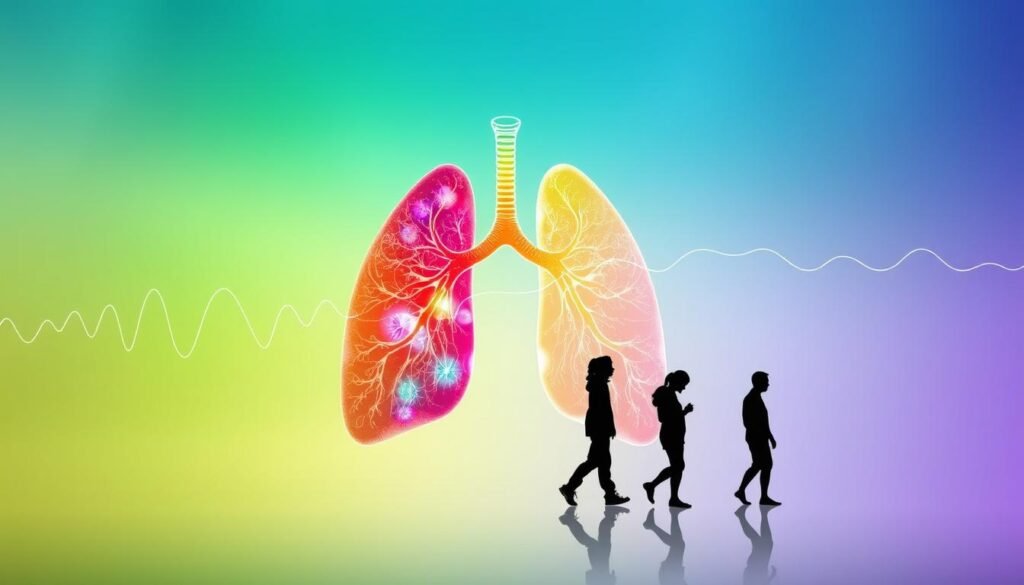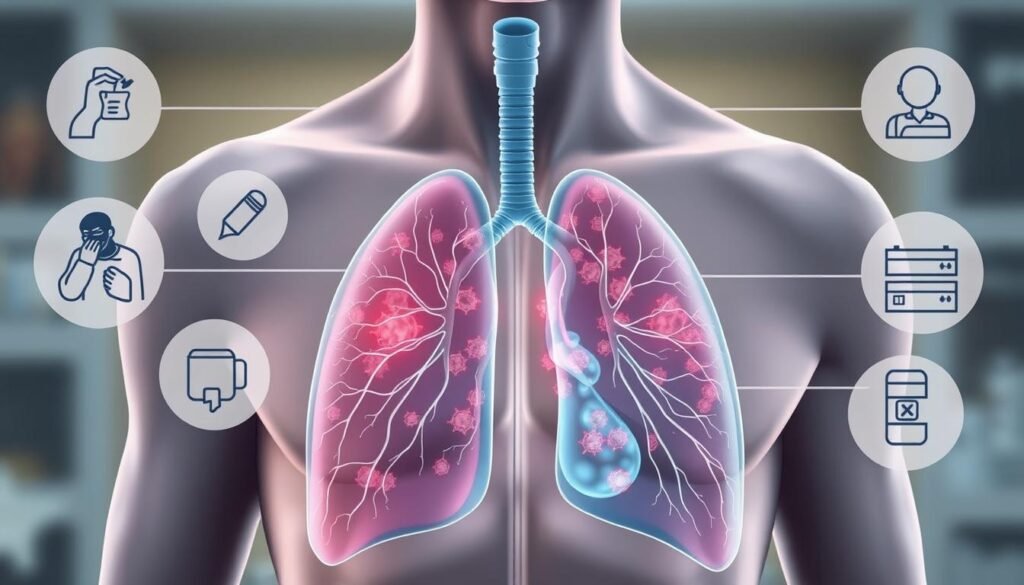About 90% of acute bronchitis cases come from viruses like the common cold or flu. This condition can greatly affect daily life by causing ongoing symptoms and tiredness. Many people don’t pay much attention to the fatigue that follows. In fact, this tiredness can last much longer than the acute phase of bronchitis.
It’s important to understand the details of bronchitis for those looking for answers on bronchitis fatigue how long it lasts. Acute bronchitis usually gets better in one to three weeks. However, chronic bronchitis can stay for months and often relates to continued health problems like smoking. Knowing the difference between these types is key for the right care during the bronchitis recovery period.
In this guide, we’ll go over symptoms, bronchitis types, and how to recover effectively. By the end, you’ll know what to expect when dealing with bronchitis fatigue. You’ll also learn how to speed up your recovery and avoid further issues. For more on bronchitis, check out this informative resource.
Key Takeaways
- Acute bronchitis is often viral, typically lasting 1-3 weeks.
- Chronic bronchitis can persist for at least three months each year.
- Prolonged fatigue can occur post-recovery from both types of bronchitis.
- Quitting smoking greatly reduces the risk of chronic bronchitis.
- Symptoms of bronchitis can vary significantly in duration and severity.
Understanding Bronchitis
Bronchitis inflames the bronchi, connecting to the lungs. It’s often called a “chest cold.” It can come from viruses, bacteria, or irritants like smoke. Spotting bronchitis symptoms early is crucial. Symptoms include a cough, feeling tired, and breathing hard.
Getting a correct bronchitis diagnosis is important. Symptoms can look like other lung issues. The right treatment helps you get better fast. Bronchial infection fatigue length varies. Acute cases last about a week to ten days. Chronic cases mean a cough for three months, happening two years in a row.
Many things raise your risk of getting bronchitis. Smoking, weak immunity, and certain jobs can increase risk. Even stomach reflux might make it worse. Every year, over 13 million Americans get acute bronchitis. Most people feel better in two to three weeks.
Chronic bronchitis is related to COPD but is not usually deadly. It’s riskier for the elderly, kids, and those with health problems. Knowing and managing bronchitis symptoms is key for at-risk groups.
Types of Bronchitis
Bronchitis splits into two main bronchitis types: acute and chronic. Each type has different causes, symptoms, and needs for care.
Acute bronchitis comes from viral infections, like those causing colds and flu. Symptoms usually last about 10 to 14 days. But a cough can stay for up to eight weeks. Acute bronchitis can lead to:
- Cough
- Chest soreness
- Runny nose
- Fatigue
- Headache
- Chills
- Fever
- Sore throat
Since it’s mostly viral, antibiotics aren’t often needed for acute bronchitis. However, it sometimes turns into chronic bronchitis or pneumonia. In such cases, different treatments are needed.
Chronic bronchitis means long-term symptoms that last over three months and keep coming back for more than two years. It’s mainly seen in smokers. Getting help early is key. It’s important for people with chronic bronchitis to keep an eye on their symptoms and tell their healthcare provider about any big changes.
To lessen the chance of getting acute bronchitis, wash hands often, steer clear of sick people, and keep vaccinations up to date. If symptoms linger or get worse, seeing a doctor is wise.
| Type of Bronchitis | Duration of Symptoms | Common Causes | Typical Patients |
|---|---|---|---|
| Acute Bronchitis | 10-14 days (cough may last up to 8 weeks) | Viral infections | General population |
| Chronic Bronchitis | Symptoms lasting over 3 months with recurring episodes | Long-term smoking | Primarily smokers |
Acute Bronchitis Symptoms and Duration
Acute bronchitis causes swelling in the air passages. This leads to several symptoms. People often face a cough that produces mucus, feel chest discomfort, get tired, and have a slight fever. Harder breathing during activities can also interfere with everyday tasks. Symptoms usually begin to get better in about 7 to 10 days if no other lung problems are present.
The cough may stick around even after other symptoms are gone. It can last 1 to 4 weeks more. During this time, the acute bronchitis tiredness duration means tiredness might also continue. Rest, plenty of water, and managing symptoms well are key during recovery.
Acute bronchitis is often caused by a virus, so antibiotics usually aren’t needed. Symptoms generally clear up within a week. If bacteria cause the infection, then antibiotics might be used. It’s important to keep an eye on symptoms, especially if there’s ongoing coughing, chest pain, high fever, or blood in coughs. To feel better, drink fluids, use pain relievers as needed, and stay away from smoke.
| Symptom | Typical Duration |
|---|---|
| Cough (with mucus) | Up to 2-3 weeks |
| Fatigue | Variable (may last longer than 2-3 weeks) |
| Dry cough | 1-4 weeks after recovery |
| Chest discomfort | Varies by individual |
Watching your symptoms and focusing on recovery can greatly help. It reduces the chance of getting chronic bronchitis or pneumonia. Knowing all about acute bronchitis helps people manage better.
For more tips on dealing with acute bronchitis, check out this helpful guide.
Chronic Bronchitis: A Deeper Look
Chronic bronchitis is a health issue that affects your lungs for a long time. It causes constant swelling in the breathing tubes. This leads to coughing a lot and making more mucus. It makes everyday tasks hard to do. Most people who get this are over 40. And 75% of them have smoked before. This shows smoking is a big reason people get chronic bronchitis.
People with this condition get very tired easily. This tiredness makes it hard to do normal activities. It also lowers their quality of life. To feel better, they can take medicines like bronchodilators and steroids. These help with the symptoms and make breathing easier. Making changes in how you live, like stopping smoking, also helps a lot.

There are special tests, like spirometry and chest X-rays, to find out if someone has chronic bronchitis. People with it should get flu and pneumonia shots because they can get very sick from these illnesses. Low blood oxygen levels can be helped with oxygen therapy. This makes it easier for them to breathe.
Getting better also includes exercising and eating well. These steps really help manage the symptoms of chronic bronchitis. Taking steps to fix adrenal fatigue by eating right and managing stress helps too. You can find more tips on wellness here.
Dealing with chronic bronchitis is tough. But, managing it well can really improve your life.
How Long Does Bronchitis Fatigue Last?
Getting to know how long fatigue from bronchitis lasts is important. Everyone experiences bronchitis differently. This means they recover at their own pace.
Understanding the Recovery Timeline
Acute bronchitis usually takes about three weeks to get over. However, tiredness can last even longer. As your body heals, you might feel weak for weeks. Many wonder exactly how long this weakness lasts. It often continues throughout the healing journey.
Factors Affecting Duration of Fatigue
Many things can affect how long you feel tired from bronchitis. Your health, lifestyle, and how well you follow doctor’s orders matter a lot. Those with lung problems or who smoke may feel tired longer. Knowing these things helps deal with symptoms better.
| Factors | Description |
|---|---|
| Overall Health | Individuals with better baseline health tend to recover more quickly from bronchitis fatigue. |
| Treatment Adherence | Following medical advice and treatment plans can significantly shorten the bronchitis recovery period. |
| Lifestyle Choices | A balanced diet, adequate hydration, and sufficient rest contribute to a more efficient recovery. |
| Respiratory History | Those with prior lung issues may encounter prolonged bronchitis lethargy duration and fatigue. |
Being aware of these factors can make it easier to handle symptoms. It improves how quickly you feel better from bronchitis.
Common Symptoms of Bronchitis
People with bronchitis often face symptoms that are easy to notice but hard to handle. The most common symptoms of bronchitis are:
- Persistent cough: This can happen with or without the production of mucus.
- Fatigue: Those with bronchitis may feel very tired, making everyday tasks difficult.
- Chest tightness: This can feel like pressure in the chest area.
- Shortness of breath: It can be hard to breathe, which is concerning.
- Fever: Sometimes, a mild fever can show there’s an infection.
Knowing these symptoms is key for early treatment. While they might seem scary, understanding them helps with better care. Acute bronchitis usually gets better in about a week to ten days. However, feeling tired and a lasting cough can remain for weeks.
Acute and chronic bronchitis are different. Chronic bronchitis means a long-lasting cough that’s there for over three months, happening again and again. People who smoke or are around air pollution a lot are more at risk. If you have a high fever, see blood in your mucus, or symptoms that don’t go away, get medical help right away.

Impact of Bronchitis on Energy Levels
Bronchitis affects energy levels, whether it’s acute or chronic. Acute bronchitis’s tough cough often makes people super tired. This happens because coughing messes up sleep, making you less rested. With a virus causing the bronchitis, the tiredness can get worse as your body fights the illness.
The time you feel tired usually matches how long it takes to get better. This can be from days to weeks. Rest is key here, as fighting off the infection needs a lot of energy. Getting dehydrated makes recovery harder, showing how important it is to drink plenty of fluids.
Eating foods full of nutrients is vital for getting better. When you’re sick with bronchitis from an infection, your body might be missing key nutrients. Eating well helps bring back energy and supports your immune system. Here are some tips to help yourself:
- Elevating the head while sleeping to improve breathing.
- Eating well to boost energy levels.
- Reducing the intake of sugary and fatty foods that may weaken your immune system.
Herbal remedies, like Ivy and Thyme, can help by making mucus less thick and supporting your immune system. Then, there’s Balance Mineral Drink. It’s full of important electrolytes and nutrients that might ease the tiredness after being sick.
Standard treatments might include medicines to deal with mucus or to help with a dry cough. But antibiotics usually don’t work against acute bronchitis if it’s caused by viruses. High-risk groups for bronchitis include the elderly, little kids, those who smoke, and people with weak immune systems. That’s why it’s so important to know about the tiredness bronchitis can cause and its effects.
| Factor | Impact on Energy Levels |
|---|---|
| Persistent Cough | Interrupts sleep, leading to increased fatigue |
| Viral Infections | Body expends more energy to fight infection |
| Hydration | Dehydration can slow recovery and drain energy |
| Nutrition | Essential for recovery, affects stamina levels |
| Rest | Crucial for recovery; boosts immune response |
Effective Treatments for Bronchitis Exhaustion
Finding the right way to treat bronchitis exhaustion can be hard, because bronchitis comes in two types. Acute bronchitis gets better by itself, needing just some care at home and enough rest. It might take a few days up to two weeks to feel better. To ease the tiredness that comes with bronchitis, it’s best to manage the symptoms you have. Taking over-the-counter medicines like pain killers and cough syrup can help make you more comfortable. Also, drinking plenty of fluids and resting well are key to getting better.
If you have chronic bronchitis, the treatment is a bit more involved. This condition usually comes from being around things that irritate your lungs for a long time. To improve, making changes to your surroundings and habits, like stopping smoking, is crucial. Treatments include:
- Bronchodilator medications to open airways.
- Inhaled corticosteroids to reduce inflammation.
- Oxygen therapy for severe cases to improve breathing.
- Pulmonary rehabilitation to strengthen lung function.
Though there’s no cure for chronic bronchitis, the right care can help keep symptoms under control. This means living a better life. Each person’s treatment for bronchitis treatment for exhaustion should be based on their own health and other conditions they might have.
Finally, no matter if it’s short-term acute bronchitis or ongoing chronic bronchitis, finding effective treatments is key. Knowing your options gives you the power to manage your health better.
| Type of Bronchitis | Typical Duration | Common Treatments | Lifestyle Modifications |
|---|---|---|---|
| Acute Bronchitis | Days to 2 weeks | OTC pain relievers, cough suppressants | Rest, hydration |
| Chronic Bronchitis | Ongoing (3 months/year) | Bronchodilators, corticosteroids, oxygen therapy | Quitting smoking, avoiding irritants |

Managing Bronchitis Fatigue at Home
Dealing with bronchitis fatigue at home includes using practical strategies and helpful treatments. Rest is vital for recovery from the illness. Getting enough sleep helps ease bronchitis tiredness and promotes healing.
It’s crucial to stay hydrated. Drinking 8-12 glasses of water a day helps to make mucus thinner. This can make coughing less frustrating. Warm drinks like herbal teas are soothing and nutritious, aiding in recovery. Eating a diet full of fruits, veggies, whole grains, and lean proteins boosts energy. Adding turmeric, ginger, and garlic to your diet can calm throat and chest discomfort.
Home remedies like steam inhalation make breathing easier. Throat comfort can also come from using non-medicated lozenges. Activities like yoga or meditation reduce fatigue and improve mental health.
Creating a supportive environment is important. Keeping your air clean of dust, smoke, and harmful chemicals helps recovery. Staying away from people with colds or the flu is crucial to protect your lungs, aiding in managing bronchitis symptoms.
Regular, gentle exercise can boost your energy and lung health. Walking or doing breathing exercises can greatly help in dealing with symptoms long-term.
To learn more about alternative therapies for bronchitis, looking into holistic approaches can further support recovery.
Conclusion
Knowing about bronchitis and how to handle it is key for getting better. Bronchitis affects energy and health a lot. About 5% of all breathing sicknesses in the U.S. are acute bronchitis. Each year, there are more than 10 million doctor visits for it. This shows how common it is and why we need good ways to deal with it.
To fight off the tiredness from bronchitis, spotting the signs early and getting medical help is important. A study shows that 66% of adults get medical advice within the first week of feeling sick. This quick action is vital for getting better. Since bronchitis is mostly caused by viruses, not bacteria, it’s important to get the right diagnosis and treatment plan.
In the end, though bronchitis is tough, knowing what it is and how to manage its tiredness can really help with recovery. Getting help from doctors and following their advice can make life better for those affected. It can help patients get back to good health quicker and more effectively.